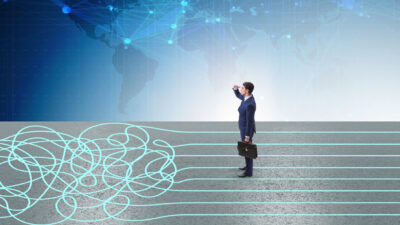In early 2020, people around the world were forced to quickly adapt to working in their homes in response to the COVID-19 crisis. For some, it was an accelerated adoption of practices already in place, supported by policies, tools and management. For many others, however, it was an abrupt shift as managers, HR leaders and IT professionals rushed to maintain business continuity in the face of an uncertain future.
Initial feedback was encouraging, as many were surprised by their successful transition: business continued almost as usual, people and systems adapted. The crisis-response experience has started a new conversation about where work can happen, and based on years of our previous workplace research, it’s one that employees would say is well past due. The experience has left many wondering about the future of the office: what is its purpose, and is it necessary to the growth, evolution, and success of your business?
The future of work in a post-pandemic world is forcing organizations to think beyond productivity and transactional work, which is quickly becoming automated through Artificial Intelligence (AI) and Big Data. The business of tomorrow will rely on workers with soft skills that are impossible to automate. Leading this change is a focus on innovation – anticipating and adapting to quickly changing conditions and customer demands of the emerging Conceptual Age.
(Source: Discovery In Action)
As business continues to be disrupted by technology and automation, there is growing demand for advanced skills such as empathy, communication and judgement. These skills cannot be gained through passive learning, but rather require leaders to model, coach, and nurture essential behaviors and capabilities.
“The age of automation need not be a threat. If we apply our humanity — to be creative, critical, and collaborative — it can be a competitive advantage”
– RBC, Humans Wanted report
These changing attitudes will require alignment of an organization’s culture and values with an environment that supports the development of trust and mentoring relationships. Enabled with these ‘soft skills’, groups are well positioned to accelerate innovation, which is critical to an organization’s ability to adapt to changing demands of clients and markets. It is widely agreed that innovation is not the product of an individual, but the combined effort of a diverse group of experts with shared values who are able to collaborate, co-create and share knowledge. While innovation projects can be formally managed, the innovation process relies heavily on both chance encounters and focused collaboration across a broad network of expertise. This diverse dynamic of complex work requires physical proximity, facilitating teams to coalesce faster and achieve better results.
“Invention + Entrepreneurship + Community = Innovation”
–Dr. Ari Massoudi, Strategy of Innovation
Workplace Ecology: Creating an environment for growth
A business ecosystem can be defined as the inter-relationships between and among people and the various systems and environments in place at work. Every organization’s ecology is unique and is most successful when it embodies the unique culture, processes, and values of your organization.
Based on Colliers 2020 Global Survey results, the aspects that people miss most when exclusively working from home are human connection, interaction with their colleagues, and the ease of collaboration. While the ability to choose where to work will continue to be important, leaders are wise to consider what their organizations aspire to, and how the business systems need to work together.
Business processes endeavor to be better and faster. Co-locating integrated teams helps to harness creative capital and accelerate problem-solving and idea generation in ways that are difficult to replicate via Zoom or Skype. In face-to-face encounters, we continually process non-verbal cues that enrich communication, create rapport and build the trust that nurtures a cohesive culture.
As the most visible manifestation of organizational culture, the workplace plays a significant role. Your workplace is not a passive container of activity, but an active influencer of what you do and how you feel. If done well, it demonstrates what is important and encourages specific desired attitudes and behaviors. It tells your story and differentiates your organization from others.
The workplace is a critical component of the ecosystem of any business. The pandemic has offered us an opportunity to rethink the workplace, to put people, safety and innovation first. A bespoke environment can provide a holistic experience that embodies your organization’s culture, brand and values; it can inspire innovation, boost productivity, and enhance employee engagement.

 Colliers Insights Team
Colliers Insights Team


 Chris Zlocki
Chris Zlocki
 Adam Schindler
Adam Schindler